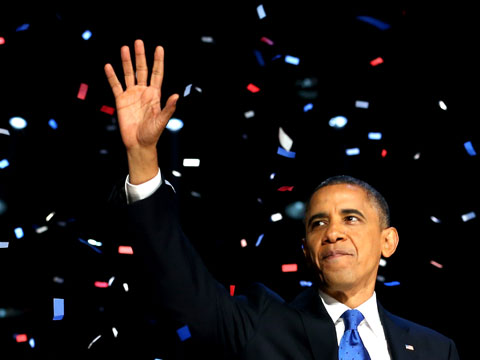
Washington, November 19: The small Indian-American community - constituting just about one per cent of the US population never had it so good as under the Obama administration, with a record number of community members being roped in to head top administrative positions.
President Barack Obama recognising the immense talent and potential of this community numbering about 3.1 million, not only appointed a record number of Indian-Americans to his administration, but also there is hardly any major wing of the US government ranging from his own White House to departments of State, Treasury, Defence and Commerce that some of the key positions are not being held by an Indian-American.
While there is no official or unofficial figure of the number of Indian-Americans appointed by Obama in his administration in the first four years of his Administration, it is estimated that the list could easily be at least a few dozens or even touch the 50.
This is a far cry from the Regan Administration when the first Indian Americans was appointed to a senior administration post to his administrations. In 1987, Regan appointed Joy Cherian to Equal Employment Opportunities Commission. He later on went on to become its Commissioner from 1990 to 1994. And in 1990, Sambhu Banik, a Bethesda psychologist, was appointed as executive director of the President's Committee on Mental Retardation.
Indian Americans have come a long way since them and have travelled quite a distance under the Obama Administration. Obama, who in four years ago became the first African American to have been elected as US President, appointed Raj Shah, as administrator of USAID the highest ranking Indian American in any administration.
Vinai Thummalapally, the US Ambassador to Belize, became the first Indian-American Ambassador in the US history. Highly talented, Vikram Singh in his capacity as the Deputy Assistant Secretary of Defence for South and Southeast Asia (SSEA) is the highest ranking Indian American official in the Pentagon.
The anti-terrorism and anti-Wall Street crusade of Preet Bharara, the US Attorney, who is another Obama appointee, is well known. Subra Suresh in his capacity as Director of the National Science Foundation, the agency responsible for promoting science and engineering through research programs and education projects, overseas billions of dollars in scientific research.
Towards the fag end of the first term of the Obama administration at least two dozen Indian Americans were working at senior positions in the Obama administration. While Nisha Biswal, is Assistant Administrator, Bureau for Asia, in the USAID; Islam Siddiqui having the rank of an Ambassador is Chief Agricultural Negotiator at the US Trade Representative (USTR); Priya Aiyar serves as the Deputy General Counsel for Environment and Nuclear Programs in the Department of Energy.
Among other Indian Americans currently holding important posts in the Obama Administration include Mythili Raman (Department of Justice), Subhasri Ramanathan, Counselor to the Secretary, Department of Homeland Security; Sri Srinivasan, Principal Deputy Solicitor General in Department of Justice; Kiran Ahuja, Executive Director of the White House Initiative on Asian Americans and Pacific Islanders (AAPI), Nealesh Kemkar, Deputy Counselor to the Secretary in the Department of Interior; and Lopa P Kolluri, who is Deputy Chief of Staff, Operations and Strategy in the Department of Housing and Urban Development.
Taara Rangarajan is Special Assistant to Susan Rice, the US Ambassador to the UN; Atman Trivedi serves as Senior Advisor in the Bureau of International Security and Non-Proliferation (ISN); Jeremy Bernton is Priority Placement Director; Rachana "Ruchi" Bhowmik is the Deputy Assistant to the US President and Deputy Cabinet Secretary in the White House Office of Cabinet Affairs.
A large number of the Indian Americans have made it to the White House in various capacities. While Shilpa Phadke is the White House Deputy Director Of Cabinet Affairs; Gautam Raghavan is Associate Director of Public Engagement at the White House and Aneesh Raman serves as the presidential speech writer at the White House. Rishi Sahgal is Deputy Associate Counsel at the White House; Kevin Samy has been appointed as the Special Assistant for Public Engagement at the White House Council on Environmental Quality; Kamala Vasagam, Special Assistant to the President, Office of Presidential Personnel, and Rohan Patel is Associate Director for Public Engagement, White House Council on Environmental Quality.
Puneet Talwar in his capacity as the Senior Director for the Gulf States, Iran and Iraq at the White House National Security Council, is playing a key role in driving the Administration's policies in the region at a critical time. Not to miss, the distinction to be the first White House official videographer has gone to an Indian American Arun Chaudhary. The Obama Administration has also banked heavily on Indian Americans when it comes to its outreach to the Muslim world. While Rashad Hussain, an attorney serves as the US Special Envoy to the Organisation of Islamic Cooperation (OIC), Farah Pandith was appointed Special Representative to Muslim Communities in June 2009.






Comments
Add new comment